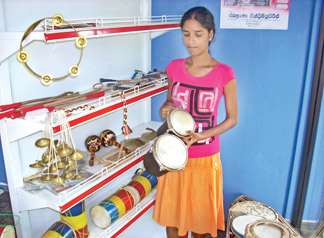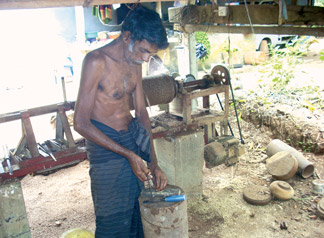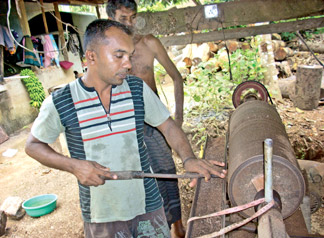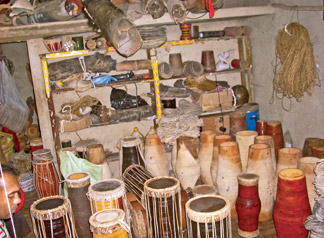|
Call to buy products directly:
Direct sales more rewarding, say drum manufacturers
By Ananda WEDAARACHCHI

Selling products |
 |

Rohana at his workshop |
 |
| Manufactured
drums |
The drum manufacturing industry boasts of a recorded history of over
2,500 years among traditional Sri Lankan industries, even before Prince
Vijaya arrived in the country. History reveals that a large number of
tribes including Veddhas were living in the island several years before
King Vijaya ruled the country. It is said that even the members of the
Veddha community were engaged in the drum manufacturing industry.
During that period people had no particular religion. They worshipped
the sun, the moon, rocks and mountains. Most of them were engaged in
religious activities and devil dancing rituals the whole day.
The livelihood of many people living during this period was drum
manufacturing. Beating drums were the major ritual of many religious
ceremonies. The legend says that even king Vijaya wanted his men to play
drums at ceremonies. Therefore the drum manufacturing industry had
become very popular during that period.
Like in the olden days, the drum manufacturing industry has become
very popular at many parts of the country today. Statistics reveal that
over 10,000 families in Kandy, Matara, Galle, Matale, Ambalangoda,
Alawala, Attanagalla and Kaduwela are still engaged in the drum
manufacturing industry. It is said that over 150,000 people are engaged
in the drum selling industry and over 300,000 persons including
schoolchildren are using various types of drums - for wedding
ceremonies, cultural events, opening ceremonies, funerals and school
bands.
Drums are also used by the Sri Lanka Army, the Air Force, Police and
the Navy bands.
Therefore, the drum manufacturing industry cannot be recognised as a
dying industry as many other industries, since these musical instruments
such as Up country Bera (Udarata Bera), Low Country Bera (Pahatarata
Bera), Davul Bera, Tammattam, Dolki, and Tabla are used for many
occasions in the country.
Bera (drums) are used in almost all countries for official functions
and especially in the Southern part of India, for religious occasions.
The Sunday Observer last week visited several villages to meet drum
manufacturers and also to see the development of this industry which
people hardly talk about unlike many other industries.
A resident of Alawala village in Attanagalla and a long-standing drum
manufacturer, 38-year-old Rohana Wijesinghe was very happy to see a
media team in his village for the first time and said that he has been
in the industry for the past 15 years.
"This has been a family business as I learned the art from my father
W. A. Premadasa who learned about the industry from his father Napin
Singho who was a very famous drum manufacturer in the 1940s."
According to Rohana, the body of the drums are manufactured with hard
timber taken from either Coconut, Jak, palmyrah, Ehela or Kohomba trees.
Since Kohomba and Ehela trees are rare and also prohibited for cutting,
drum manufacturers are mostly using the trunks of coconut, jak and
palmyrah trees.
He wanted authorities in the Divisional Secretariats to relax
restrictions for drum manufacturers to transport timber from areas such
as Kurunegala, Kandy, Moneragala and Ratnapura to carry out the business
without any problem.
Rohana also said the skins of animals such as cattle, goat, monkey
and Iguwana (Talagoya in Sinhala) are used to make both faces across the
wooden frame of the drum.
He said only the skins of cattle and goat are generally used to
manufacture the face of drums as the skins of monkeys and iguwanas are
prohibited.
Rohana further said the Udarata Beraya is also called as `Gata Beraya'
and the Pahatarata Beraya is called as 'Yak Beraya'. Udarata Beraya is
mostly used by Kandyan people for the Kandy Perahara and for up country
weddings, while the Pahatarata Beraya is used for low country dancings,
Thovil, devil dancings, for cultural pageants such as peraharas in
temples and devalas.
He said in addition, Davul Beraya and the Tammattama are used for
dancing items and especially for the Tevava ceremony at Dalada Maligawa.
He said the Gata Beraya and Tammattam are also used by Western and
Eastern bands in schools.
Rohana said although their products are purchased by the Ministry of
Cultural Affairs, the Education Ministry and several other Government
organisations, they purchase them through middlemen and this resulted in
selling them at give-away rates to middlemen.
He therefore proposed Government institutions to purchase their
products straightaway from manufacturers, so that manufacturers could
get an additional income rather than selling them to middlemen. Rohana
also highlighted the invaluable service being rendered by the Jathika
Shilpa Sabhawa and its Chairman Buddhi Keerthisena for the uplift of
traditional industries and said that the Shilpa Sabhawa also sends
traditional industrialists to India every year for exhibitions.
He has also won the 'Kalabooshana Award' and two 'Rajatha awards' in
2009 and 2010, given by the Government to encourage traditional
industrialists.
A drum manufacturer of Nittambuwa, Ranuka Wijesinghe proposed the
Government to buy their products straightaway from manufacturers and not
from the middlemen.
He said unlike other industrialists, there are only a few drum
manufacturers in the country and requested the Government to recognise
their industry and provide more welfare facilities for them to survive
in the industry.
A long-standing drum manufacturer, Ruange Pieris of Kalutara said he
has been in the industry for the past 26 years and he earns sufficient
income from it.
He proposed the authorities to make arrangements to send their
products to foreign countries as there is a great demand for locally
made drums.
He said manufacturers sell a big 'Gata beraya' to middlemen or any
other Government owned shops in Colombo and to the shops at Katunayaka
Air Port for Rs. 3,500, but they sell the same 'Beraya' to foreigners at
Rs. 6,500.
He therefore proposed the Government to arrange a shop at the Air
Port for the benefit of drum manufacturers.
A female drum manufacturer of Mawanella, Asilin Hamine said she has
been in the business for the past 38 years and she is engaged in the
business with the help of her three grandsons.
I earn about Rs.30,000 a month from selling the products to
foreigners through tourist hotels in Kandy.
She wanted the Government to hold a get-to-gether of drum
manufacturers in the country and discuss their grievances.
She said former President Ranasinghe Premadasa called them twice and
discussed their problems and requested the present President also to
hold a conference for them. |

